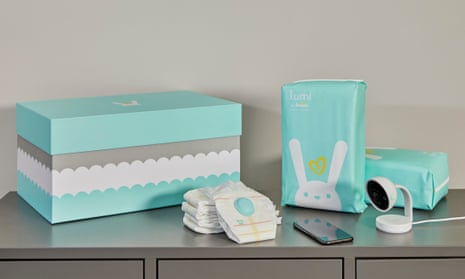This week’s instalment of innovations no one was waiting for is brought to you by Pampers, which has announced a “smart nappy” system. Lumi consists of a sensor that you stick to a specially designed nappy; the gizmo then beams information about how much your little bub is peeing and sleeping to a dedicated app. You can complement this with a video monitor that links to the app and tracks room temperature and humidity. Voilà: your embarrassingly low-tech baby is now a sophisticated analytics machine.
If you can’t wait to start a more data-driven relationship with your newborn, I am afraid to say there is no word on when Lumi will launch in the UK (it arrives in the US this autumn). If you are in South Korea, however, you can grab some Huggies smart nappies; these let you know, via Bluetooth, whether your baby has urinated or defecated. A truly brilliant update to the obsolete technology known as “your nose”.
Smart nappies are just one of a growing range of products aimed at quantifying your baby. Mimo Baby, for example, offers a range of connected onesies that measure your child’s vital signs and transform them into daily timelines, allowing you to feed your parental anxiety or bore other people about your child in granular detail. There are smart baby socks, smart cribs and smart feeding bottles. Basically, there is smart everything.
Just how smart it is to share your kid’s personal data with a private company is another matter. It is worth noting that Pampers’ smart nappies were developed in partnership with Verily, which is part of Google’s parent company, Alphabet. According to the Washington Post, Google reached a settlement last week with US authorities after an investigation found that it improperly collected the data of children who used YouTube. And that is just the tip of the iceberg when it comes to the broader security implications of smart devices. Surely parenting is hard enough without having to worry if a hacker has broken into your kid’s nappy?

